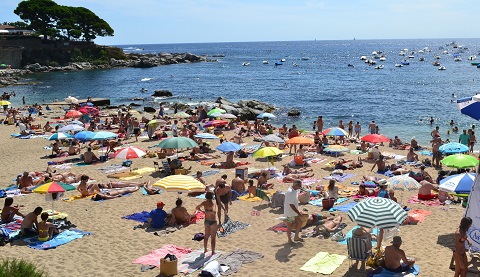Project to Analyse Effects of Waste Generated by Tourism on Mediterranean Islands

10/02/2017
The Mediterranean region is the world’s leading tourist destination and it is common for islands to contain a far greater population during the summer season. Local economies are deeply reliant on tourism for employment and income. However, this annual massive tourist wave, largely concentrated within a short period, places a great burden on the island's infrastructure, especially for waste management. Indeed, local authorities often struggle to cope with the high increase in waste generation and the often poor sorting levels of tourists.
During three years, the European Interreg MED Blue Islands project (2016-2019) will work on developing and elaborating effective, financially viable and environmentally responsible means to address and mitigate the effect of the seasonal variation of waste generated by tourism on nine Mediterranean islands. The project, co-financed by the European Regional Development Fund and led by the Ministry of Agriculture, Rural Development and Environment of Cyprus, will be developed in the islands of Mallorca (Spain), Sardinia and Sicily (Italy), Malta, Rab (Croatia), Crete, Rhodes and Mykonos (Greece) and Cyprus.
The project, which involves 14 European partners, will quantify the waste during and outside the highly touristic period, the assessment of waste composition, the impact of litter on beaches and seashores, and their effects on wastewater treatment facilities.
ICTA-UAB researcher Dr Patrizia Ziveri explains that “whilst it is a well-known phenomenon, the seasonal variation of waste generation on sea-locked islands has yet to be properly defined and its socioeconomic and environmental effect determined” and remarks that “isolation and the lack of space for facilities create an additional constraint for these territories”. The Blue Islands project aims to provide answers to these concerns.
The ICTA-UAB, in collaboration with its partners, will assess the dynamics of micro and macro plastics in highly touristic coastal areas. During the first year of the project, 27 key beaches will be monitored periodically. A total of 189 surveys will be conducted in 2017 to pìcture marine litter accumulation in relation to touristic activities on the selected beaches; and about 700 samples will be taken and analysed at the ICTA-UAB for micro plastics concentrations both on land and at sea.
Based on the results, different strategies will be planned and a multidimensional tool, including different action plans, will be created and implemented. The surveys will then be repeated in order to evaluate the outcome of the new measures.